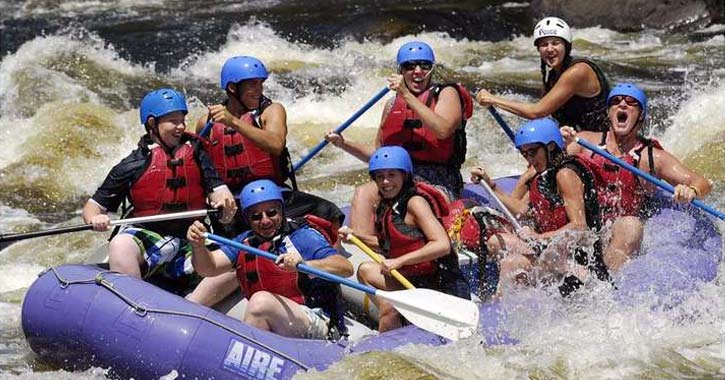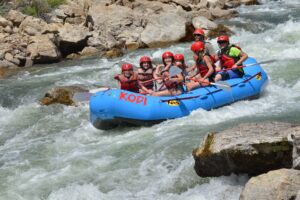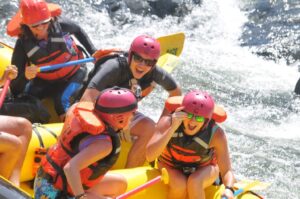To become a whitewater rafting guide, you must complete a training program and acquire certifications. This process involves getting hands-on experience and taking courses in swiftwater rescue, raft maneuvering, and outdoor leadership.
With dedication and a love for adventure, you can become a highly-skilled, qualified whitewater rafting guide. Whitewater rafting is an exciting and adventurous activity that has grown in popularity over the past few years. Whitewater rafting guides play a crucial role in ensuring a safe and enjoyable experience for rafters.
They are experienced professionals who have honed their skills through rigorous training and certification programs. Becoming a whitewater rafting guide involves a significant commitment of time and effort, but for those who love the outdoors, it can be a rewarding and fulfilling career. This article will explore how to become a whitewater rafting guide, including the training and certification requirements, skills needed, and job prospects.

Credit: www.adirondack.net
Understanding The Basics
Whitewater rafting is an exciting and adventurous outdoor activity that has become increasingly popular in recent years. For those who love the thrill of the rapids, becoming a whitewater rafting guide can be a rewarding profession. To start your journey towards becoming a guide, you need to understand the basics of this exciting sport.
What Is Whitewater Rafting?
Whitewater rafting is an outdoor recreational activity that involves paddling through rapids and turbulent water in a raft. The objective is to navigate through the rapids safely, while also having fun. Due to the varying nature of water currents, the intensity of each rafting experience varies, making each journey unique.
What Are The Different Levels Of Water Rapids?
Whitewater rapids are categorized based on a scale ranging from class 1 (the easiest) to class 6 (the most difficult). Here’s a quick overview:
- Class 1: Small, easy waves with no obstacles.
- Class 2: Small rapids with some obstacles that require basic paddling skills.
- Class 3: Moderate rapids with high waves and irregular currents, requiring intermediate paddling skills.
- Class 4: Long, difficult rapids with powerful waves, steep gradients, and turbulent water, requiring advanced paddling skills.
- Class 5: Extremely difficult rapids with complex currents, large waves, and dangerous obstacles, requiring expert paddling skills and techniques.
- Class 6: Nearly impossible to navigate, with violent, powerful waves and currents.
As a guide, it’s important to understand the different levels of rapids and their corresponding risks. Also, each class of rapids requires specific techniques to be navigated safely.
What Are The Physical Requirements To Become A Whitewater Rafting Guide?
Like any outdoor activity, whitewater rafting requires physical strength. A guide should have a good level of fitness, as the job is physically demanding and can require carrying heavy equipment, paddling for long periods, and performing rescues when necessary.
To become a guide, you must also be comfortable swimming in turbulent water, as you will need to be able to safely navigate and rescue guests in case of an emergency.
What Are The Essential Skills Required For A Whitewater Rafting Guide?
Becoming a whitewater rafting guide requires specific skills, apart from physical strength:
- Excellent communication skills to ensure that guests understand safety instructions and follow them.
- The ability to read the river effectively, understanding its currents, rapids, and obstacles.
- Strong leadership and decision-making skills to keep guests safe in unpredictable situations.
- Top-notch teamwork skills to ensure that everyone is on the same page.
- Knowledge of first aid and rescue techniques to deal with emergencies efficiently.
What Is The Difference Between A Commercial And A Private Guide?
A commercial rafting guide works for a commercial river rafting company and takes guests on guided trips. In contrast, a private guide may work for an individual or a group and offers a more customized and personalized experience by tailoring the river trip to their preferences.
As a commercial guide, you are responsible for ensuring guest safety, communicating instructions, and providing a memorable experience. However, as a private guide, you may have more flexibility and control over the trip’s pace and activities.
Becoming a whitewater rafting guide is an exciting and challenging profession that requires specific skills, fitness, and the ability to navigate unpredictable situations. Understanding the basics of the sport is crucial to becoming a successful guide.
Certifications And Training
Whitewater rafting is an exhilarating outdoor activity that involves navigating a river in a small inflatable boat. Becoming a whitewater rafting guide requires a passion for the outdoors and an adventurous spirit. In this post, we will discuss the certifications and training required to become a whitewater rafting guide.
What Are The Certifications Required To Become A Whitewater Rafting Guide?
To become a whitewater rafting guide, you need to have certain certifications that demonstrate your ability to navigate rivers and keep passengers safe. The specific certifications required vary depending on the country or state, but some common ones include:
- First aid and cpr certification: This is essential for any guide to have in case of an emergency.
- Swiftwater rescue certification: This certification demonstrates your ability to rescue passengers who have fallen into the river.
- Rafting guide license: This is issued by the state or country where you want to work as a guide.
What Are The Different Training Programs Available?
There are a variety of training programs available that can help you become a whitewater rafting guide. Some popular ones include:
- Guide schools: Many outdoor adventure companies offer guide schools where you can learn the skills required to become a guide. These programs typically last for several weeks and include both classroom and field training.
- Whitewater rafting courses: These courses focus specifically on rafting techniques and safety. They are typically shorter than guide schools and may be offered as part of a larger outdoor education program.
- Apprenticeships: Some companies offer apprenticeship programs where you can learn on the job under the guidance of experienced guides. This can be a great way to get practical experience while also earning a salary.
What Are The Costs Associated With Certification And Training?
The costs associated with becoming a whitewater rafting guide can vary widely depending on the program and certifications required. Some guide schools can cost thousands of dollars, while others may be more affordable. You should also consider the cost of travel, accommodations, and equipment when budgeting for certification and training.
How Long Does It Take To Become A Certified Whitewater Rafting Guide?
The length of time it takes to become a certified whitewater rafting guide depends on the training program you choose and the certifications required. Guide schools can last anywhere from a few weeks to several months, while other programs may be shorter.
It’s important to carefully research the programs available and choose one that fits your timeline and budget.
What Are The Ongoing Training Requirements?
Once you become a certified whitewater rafting guide, you will need to keep up with ongoing training requirements to maintain your certifications and keep your skills sharp. This can include taking refresher courses, practicing rescue techniques, and staying up to date on industry standards and best practices.
Becoming a whitewater rafting guide requires a combination of certifications and practical training. By choosing the right program and investing in your education, you can turn your love of the outdoors into a fulfilling and exciting career.
Frequently Asked Questions Of How To Become A Whitewater Rafting Guide
How Do I Become A Whitewater Rafting Guide?
To become a whitewater rafting guide, you need to start by acquiring several certifications. These certifications include first aid, cpr, and swiftwater rescue. You also need a guide’s license and to complete a guide-training program.
What Are The Requirements For Becoming A Whitewater Rafting Guide?
To become a whitewater rafting guide, you need to be at least 18 years old and in good physical condition. You also need to know how to swim and have excellent communication skills. A valid driver’s license is a plus.
What Are The Job Prospects For Whitewater Rafting Guides?
The job prospects for whitewater rafting guides are excellent. As the adventure tourism industry continues to grow, more people are seeking out thrilling outdoor experiences. Additionally, the demand for experienced and knowledgeable guides remains high. Many guides work seasonally and travel to different locations for work.
Conclusion
As a concluding note, becoming a white-water rafting guide can be a thrilling and lucrative career path for those passionate about adventure sports and outdoor life. The profession requires dedication, hard work, and extensive training to become an expert in the field.
It offers an opportunity to work with like-minded people, explore scenic locations, and build lifelong memories. Remember to research and follow the current regulations and guidelines of your state or country and consider investing in crafting your skills through certifications and experience.
With a positive attitude, commitment, and a love for water and adventure, you can turn your passion into a successful and fulfilling career as a white-water rafting guide. Best of luck in your journey!


